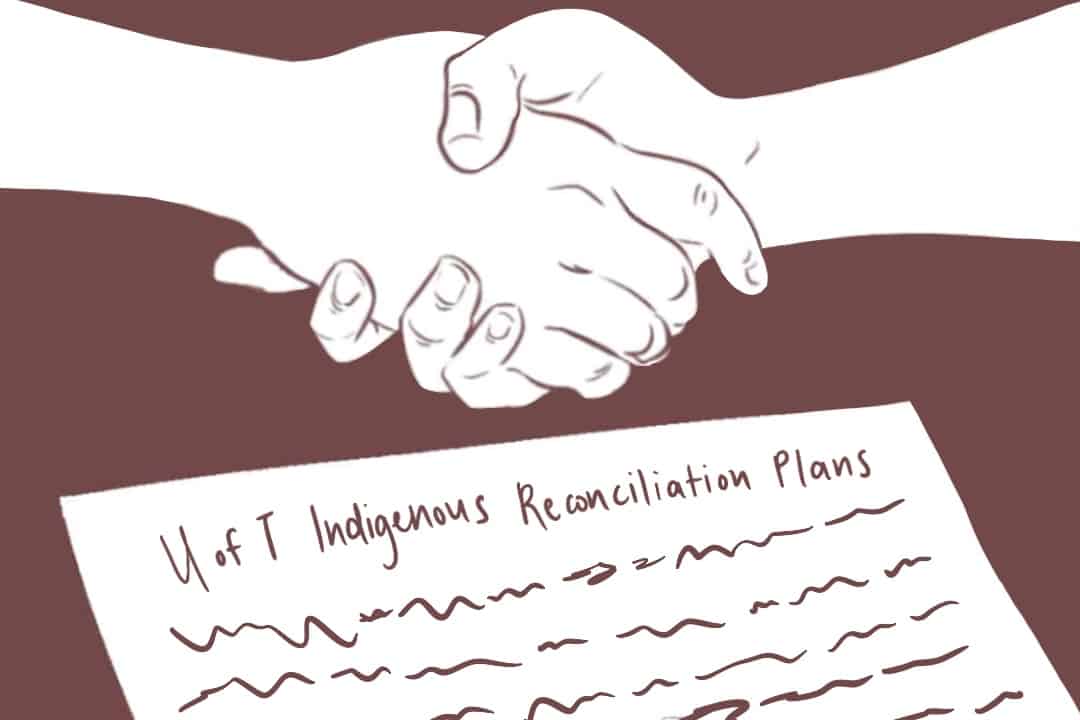Since the 2017 report from U of T’s Truth and Reconciliation Steering Committee (TRSC), U of T is still working on implementing the report’s recommendations.
U of T commissioned the report in 2017 in response to calls to action from the national Truth and Reconciliation Committee (TRC).
The report included 34 recommendations to the university on how to rebuild relationships with Indigenous communities and emphasized the need for a collective effort in order to further reconciliation. To follow up on these recommendations, The Varsity broke down U of T’s progress on Truth and Reconciliation so far.
Report findings
The TRSC acknowledged that U of T has historically been an instrument of oppression against Indigenous peoples. “The University may view itself as a benign actor in the social drama. If we learned anything from the proceedings of the TRC, however, it is that for many Indigenous people, ‘education’ was by no means benign: it was a form of repression and abuse,” read the report. “It was intended to destroy cultures and it broke up communities.”
The report said that although U of T did not have any direct involvement with the running of the residential school system, it has educated generations of leaders and policymakers who were part of the oppressive institutional power that created the residential schools. It further highlighted that researchers at the university have failed to challenge the injustice of the system, and some may have even been involved in studies that cause harm to Indigenous communities.
“For generations the University of Toronto was simply part of a dominant settler culture whose political and social actions have contributed to the profoundly difficult situations that many Indigenous people and communities find themselves confronting in the current era,” read the report.
The report made 34 recommendations in six working areas: creating Indigenous spaces on campus, incorporating Indigenous culture into university curricula, developing research ethics and community relationships with Indigenous communities, hiring Indigenous faculty and staff, supporting Indigenous students, and implementing institutional leadership.
Truth before reconciliation
September 30 marked Orange Shirt Day, as well as the first National Day for Truth and Reconciliation, which is meant to recognize and honour lost Indigenous children and survivors of the residential school system.
In a statement released on the National Day of Truth and Reconciliation, U of T President Meric Gertler pointed out U of T’s efforts and progress on reconciliation over the past years. He emphasized the importance of dialogue in reconciliation efforts and talked about rebuilding relationships with Indigenous communities, saying all parties should learn from each other through mutual engagement during the process.
“The [TRC] challenged us to acknowledge the truth and history of Canada with respect to Indigenous Peoples and what that means for reconciliation,” read the statement. “We have made progress in many areas — expanding the presence of Indigenous students, staff, faculty and librarians; incorporating Indigenous content into curricula; supporting Indigenous research programs; and creating physical spaces to honour and acknowledge Indigenous peoples, traditions, and histories on our three campuses,” Gertler added.
Shannon Simpson, director of Indigenous Initiatives at U of T and a member of the Mississaugas of Alderville First Nation, expressed how encouraged she felt about the university’s reconciliation progress at U of T’s Orange Shirt Day event this year, saying the progress was happening “at a pace that we’re not used to.”
“The growth is amazing, and the amount of faculty and staff who have come on board really has shown me that the institution does care and that they are committed,” she said. “We just want to keep that momentum going and [keep] creating these spaces.”
At a meeting of the University Affairs Board in September, Vice-President, People Strategy, Equity and Culture Kelly Hannah-Moffat gave a presentation on initiatives for Indigenous students and staff that the university has been working on. The university’s current initiatives include a number of new architectural projects, such as the Indigenous House at UTSC, the Indigenous Landscape Project at Taddle Creek at UTSG, and the Indigenous Centre at UTM.
Simpson also pointed out areas where the university needs to make more progress, including being more supportive of Indigenous students’ needs and attracting more Indigenous students by making the university a more accessible and welcoming place to them. Research conducted by the Canadian Federation of Students–Ontario in 2017 found that only 11.3 per cent of Indigenous people have a university degree, compared to 29.3 per cent of the non-Indigenous population.
Gertler acknowledged that more work needs to be done and that, moving ahead, U of T will continue to carry important responsibilities regarding reconciliation. His statement echoed the report’s stance that, although the university needs to take immediate action on it, reconciliation is a long-term process.
“Indeed, Orange Shirt Day speaks to the enduring trauma experienced by Indigenous peoples. We pause today to recognize our past, acknowledge our present – and recommit to a better future,” read Gertler’s statement.
U of T plans to set up a website tracking its progress on Truth and Reconciliation efforts — a similar initiative to the website the university created to track its progress on implementing the recommendations of the Anti-Black Racism Taskforce Report.


